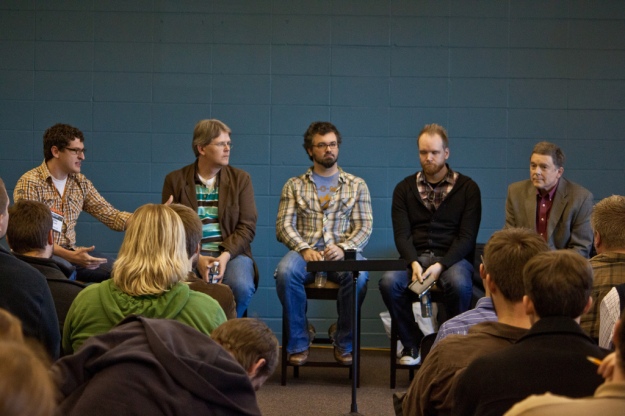 Church music has always existed — it is music made with the purpose of praising God and instructing his people while gathered together in a public service. Today it’s often called worship music. This is the music that Kristen and I are called to, and the music we write about most often at My Song In The Night. But today let’s talk about another kind of music, one that is related in terms of lyrical content.
Church music has always existed — it is music made with the purpose of praising God and instructing his people while gathered together in a public service. Today it’s often called worship music. This is the music that Kristen and I are called to, and the music we write about most often at My Song In The Night. But today let’s talk about another kind of music, one that is related in terms of lyrical content.
Proponents of Christian music promote it as music that sounds like the latest musical genres favored by a given culture, with lyrics that are edifying for Christians and “safe for the whole family.” It doesn’t have to be as “singable” as worship music, or bound to a certain liturgical function, but is meant to carry a Christian message. And yet many of the most diehard critics of this music are evangelical Christian pastors, scholars, musicians and music critics. What gives?
The discussion is laden with emotion on both sides, largely because one side interprets the other’s argument as “You make/enjoy music that stinks, and it actually hurts the cause of Christ rather than help” (and this is in fact what many on the other side are saying).
Big problems exist with labels like Christian Rock or CCM, and with the creation and marketing of music under these labels. At the same time, some of the arguments people make against them are unfair, simplistic and mean-spirited.
In my article about the potential name change for the Southern Baptist Convention, What’s In A Name, I told you some of my radio experience as a music director and DJ for Southern Gospel and, later, Christian Country music in the early 1990s:
Some suggested “Why not call ourselves “Christian Country, like the Christian Rock industry has done (as opposed to the older term “country gospel,” which carried old-time music connotations the younger artists wanted to avoid)?”
Brooks, Twain and others had caused an explosion in country music sales, concert tickets and radio ratings. So, as artists like Stryper and Petra had piggybacked on the popularity of rock music, maybe we could piggyback on country music.
Christian Country has never approached the popularity of Christian Rock and Contemporary Christian Music (CCM) because many country music fans, DJs, recording executives and artists already think of themselves and the country genre as “Christian.”
Nevertheless, using the term “Christian” to define and promote any grouping of artists and songs is problematic. Many church goers do not support Christian music, and artists themselves often go to great lengths to avoid being labeled “CCM” or “Christian artist,” even if they are Christians, singing songs about Christ.
Others don’t understand why any Christian would be against it. They point to bands and singer-songwriters in the genre who sing well, play well and write well, who have blessed the Church and have played skillfully before unbelievers. So what’s the problem? Why do so many people want to avoid Christian labels? Why don’t more church goers listen to this music?
Regardless of the motives of individual bands, singer-songwriters and others in the music business, many people see the whole enterprise as an inorganic, market-driven approach.
Often, this is not true — sometimes if a Christian band sounds like a secular band, it’s because they love that band’s music and are influenced by them in the same way that any artist is influenced by others. But why are their lyrics different? Because they’ve been redeemed by Jesus and they want to sing about it. It’s the most exciting, lasting thing that ever has or will happen to them, and they want to share this through their art. It’s not a marketing plan. They love Jesus and want to sing about him.
However, the inorganic, market driven nature of Christian music is true enough in the industry’s core and its past. And again, I speak as a former insider, although I was only in my early 20s during my radio programming days. The “behind the scenes” people I was working with in the early 90s wanted to find Christians who could be produced to sound like the top country artists of that time and to market them as “the Christian alternative.” And they were doing so because many of these same people had already done this once, with Christian Rock or CCM in the 1970s and 80s. It’s just the way they thought:
“Find artists who sound like today’s hot secular artists, then guide them into producing an album that sounds like the hot secular albums of today. Then tell people ‘If you like ________, here is a clean alternative.”
What they couldn’t understand is how distasteful and contrived this seemed to many people, who didn’t want anything to do with music that aims to be the spoonful of sugar that helps the gospel medicine go down.
When You Copy Someone Else, You Will Almost Always Be Worse
You can’t out-U2 U2.
No artist creates in a vacuum. We are all (including U2) influenced by others. But great artists are able to Continue reading →
 Stephen Altrogge of Sovereign Grace Ministries is a versatile guy. And as a pastor, author, songwriter, worship leader and blogger at TheBlazingCenter.com, he knows more than a thing or two about creativity and productivity.
Stephen Altrogge of Sovereign Grace Ministries is a versatile guy. And as a pastor, author, songwriter, worship leader and blogger at TheBlazingCenter.com, he knows more than a thing or two about creativity and productivity.







